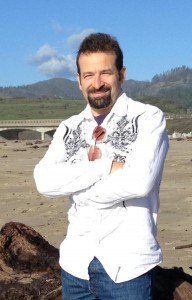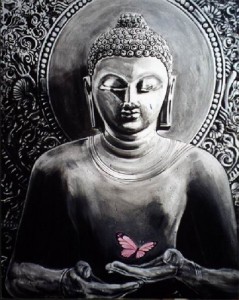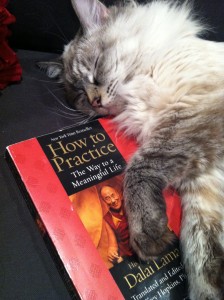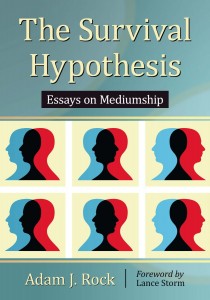
Empirical survivalists believe in life after death and also believe that there is observational data that provide evidence for this. Arguments for survival based on this alleged evidence are designated empirical arguments for survival. An important feature of these arguments is “ruling out” various explanatory competitors that attempt to account for the data in some way other than by postulating persons surviving death. This eliminative procedure is partly a consequence of the structure of most empirical survival arguments. The arguments typically maintain that certain empirical data are evidence for survival because the survival hypothesis is the best explanation of the data. The comparative strength of non-survival counter-explanations of the data thus becomes important to the internal logic of empirical survival arguments.
The most deeply entrenched and widely discussed explanatory competitor to the survival hypothesis is the living-agent psi hypothesis (hereafter, LAP hypothesis). According to this hypothesis, very roughly stated, psychic functioning among living persons (in the form of extra-sensory perception and psychokinesis) is proposed as an ostensible explanation of data otherwise seemingly explained by the survival hypothesis. In response, empirical survivalists have presented several arguments aimed at dismantling this proposed counter-explanation of the data. When, earlier this year, Jime Sayaka interviewed me on the topic of empirical arguments for postmortem survival, I critically addressed survivalist dismissals of the LAP hypothesis in some detail. In particular, I responded to a number of questions concerning survivalist Chris Carter’s “challenge” to defenders of the LAP hypothesis.
Since my interview with Sayaka was quite dense, I’m going to use the present blog to summarize several of my criticisms of Carter’s “challenge.” It will come as no surprise to those familiar with my work that I don’t think Carter has produced a substantial challenge to the LAP hypothesis or the super-sized version of it called “super-psi” or “super-ESP”. In fact, Carter’s “challenge” simply perpetuates in popular form much of what’s wrong with the literature on survival at the conceptual level. I focus on Carter here, not because he offers anything unique or special in his critique of LAP counter-explanations; rather, he illustrates survivalist orthodoxy at this juncture, is something of a poster-boy for popular survivalist bloggers (such as Michael Prescott), I periodically receive emails from people asking me to respond to Carter’s objections, and quite a few well-known parapsychologists have endorsed his work. While I have personally commended Carter on some aspects of his work (Sudduth 2011), in the interest of advancing the empirical survival debate there’s much that is also inadequate and merits rejection after critical scrutiny.
UPDATE (June 21, 2015): Subsequent to the publication of this post, Michael Prescott and his readers offered a critical response to my arguments in his blog. My responses were published as A Response to Michael Prescott (May 19, 2014), Response to Prescott’s Minions (May 30, 2014), and Falsification, Simplicity, and Survival (June 2, 2014). The arguments I sketch here are more fully developed in my forthcoming A Philosophical Critique of Arguments for Postmortem Survival (Palgrave Macmillan, 2015).
1. Carter’s Critique of the Super-Psi Hypothesis
To give context to Carter’s specific critique of the so-called super-psi hypothesis, let’s begin with a statement of what we might call the “orthodox position” concerning the LAP hypothesis among empirical survivalists.
Empirical survivalists have usually argued that the appeal to LAP fails because either (L1) the LAP hypothesis cannot account for some sub-set of the relevant data or (L2) the LAP hypothesis can account for the data in a robust way but only by being stretched into a “super-psi” hypothesis. “Super-psi” (or “Super-ESP” as Carter prefers to call it) refers to psychic functioning with a magnitude, potency, and/or refinement for which there appears no independent evidence, especially if we restrict the evidential domain to the results of laboratory-based psi experiments. The survivalist contention is that proposed explanations of the relevant empirical data in terms of super-psi is implausible. So empirical survivalists present something of a dilemma for those favorable towards LAP counter-explanations. Either ordinary-psi (i.e., “psi” for which the majority of parapsychologists suppose there is evidence) doesn’t account for crucial bits of data, or super-psi, though it could account for the data, is implausible since it lacks independent evidential support. So the LAP defender must choose between a hypothesis that either doesn’t account for the data or doesn’t account for the data in a plausible manner.
Jime Sayaka interviewed Chris Carter (for the second time) in 2013. In the interview Carter provided a concise summary of his argument against the LAP hypothesis, an argument he presented in his most recent book Science and the Afterlife Experience: Evidence for the Immortality of Consciousness (Inner Traditions, 2013). Most empirical survivalists, and Carter is no exception here, think it’s fairly clear that ordinary-psi cannot account for salient strands of evidence. Hence, Carter speaks of “ESP of the required power and range” (emphasis mine). So survivalists tend to devote most of their energy to refuting the super-psi version of the LAP hypothesis.
Now I’ve argued elsewhere (Sudduth 2013a, 2013b) that survivalists have not adequately grounded the ostensible requirement that psi be of a greater magnitude, potency, or refinement than ordinary-psi in order to pose a problem for survival arguments. In this I’m preceded by and indebted to the high caliber work of philosopher Stephen Braude (2003). Part of the problem is that survivalists operate with an implausibly narrow conception of how living-agent psi would challenge empirical arguments for survival, and this is often further based on a weak grasp of the content of the LAP hypothesis. I’ve tried to show how ordinary-psi does indeed pose a challenge to classical empirical survival arguments. This is particularly acute when survival arguments are formulated along Bayesian lines and propose a conclusion about the net plausibility of the survival hypothesis based on the extent to which the survival hypothesis leads us to expect the data, the extent to which the data are otherwise not to be expected, and the initial credibility of the survival hypothesis.
That being said, here I’m going to focus on the second horn of the dilemma above, specifically Carter’s “challenge” to those open to or favorable towards counter-explanations of the relevant data in terms of super-psi, or at least who—like myself—think that it significantly reduces the strength of empirical survival arguments.
Carter provided the following comments on the super-ESP hypothesis in his interview with Jime Sayaka (3/1/13):
Now, actually, what I said in my book was this: ‘Evidence for the existence of ESP of the required power and range is practically nonexistent. Defenders of the super-ESP hypothesis are hard-pressed to find any such examples – outside of cases of apparent communication from the deceased.’ And so defenders of the super-PSI hypothesis have not challenged that objection, but have simply agreed with my statement.
The fact that they cannot find any such cases demonstrates the purely ad hoc nature of the super-ESP ‘explanation,’ because of the utter lack of any independent evidence for super-ESP. If super-ESP as an explanation is to be scientific, then it would predict the demonstration of such wide-ranging, virtually-unlimited powers in instances in which we are not dealing with evidence of apparent survival.
If the function of super-ESP is the use of its virtually unlimited powers by the subconscious mind to surreptitiously protect us from the fear of death by fabricating elaborate evidence that seems in every respect exactly as if the deceased are visiting or communicating, then why don’t we have evidence of our subconscious minds employing these vast powers to protect us from the actual threat of imminent death? That would at least provide a more plausible evolutionary reason for the existence of these vast powers.
Instead of offering any such evidence, these ‘recent defenders of the Super-ESP hypothesis’ simply agree that there is no independent evidence, apart from the cases apparently offering prima facie evidence of survival. This means that their “argument” is not an argument at all; rather, it is nothing more than the purely dogmatic assertion that cases of evidence for survival must be cases of super-ESP, period.
The fact that they cannot come up with any such independent evidence shows that what they propose is pseudo-science, pure and simple.
Carter’s main claims are:
(C1) There’s no evidence for super-psi outside cases otherwise suggestive of survival.
(C2) The super-ESP hypothesis would lead us to expect that such evidence would exist.
(C3) The super-ESP hypothesis is pseudo-science.
He argues (C3) on the basis of (C1).
Furthermore, he at least appears to suggest that
(C4) The super-psi hypothesis is refuted by observational data,
and this on the basis of (C1) and (C2) together.
2. Response to Carter’s Criticisms
While Carter has a good grasp of the general history of parapsychology, this is unfortunately outweighed by significant conceptual weaknesses that vitiate his treatment of the empirical survival debate and its interface with parapsychology. In particular, like many other survivalists, Carter presents no logically rigorous formulation of the argument for survival from the purported evidence. This lack of rigor results in an unfortunate masking of deficiencies in his defense of the survival hypothesis against deeply-entrenched objections, especially those concerning counter-explanations of the relevant data in terms of living-agent psi.
So let me pull together in a semi-condensed form what I’ve argued for a number of years now in response to Carter’s “orthodox” survivalist critique of the appeal to living-agent psi. I’ll try to list these in a rough order of significance, beginning with what I consider the two most significant problems. Since this is intended as a summary, I don’t develop my main criticisms in any detail, but I have provided links to my publications and on-going writing where the arguments are developed in considerable detail.
(1) Like most empirical survivalists, Carter overlooks how the survival hypothesis, if useful as a testable, explanatory hypothesis, requires supplementation with various auxiliary hypotheses that render it vulnerable to the same criticism he raises against the super-psi hypothesis, namely lack of independent support. I initially drew attention to Carter’s failure to acknowledge the role of auxiliary hypotheses in my review of his book on near-death experiences (Sudduth 2011). I’ve since developed the point at length by showing that the survival hypothesis has no predictive or explanatory power unless it’s supplemented with a large number of auxiliary hypotheses (Sudduth 2013a, 2013b, 2014a, 2014b). The same is true with respect to the appeal to living-agent psi. From this vantage point, “super-psi” is simply the appeal to living-agent psi supplemented with further assumptions about the magnitude, efficacy, and refinement of psychic functioning among living persons. These auxiliary hypotheses are arguably (presently) lacking independent support, but the same is true for the auxiliary hypotheses required for the survival hypothesis to account for the data. In fact, in Sudduth 2009 I argued that among such auxiliary hypotheses in cases of mediumship would be discarnate/deceased psi of roughly the same magnitude, potency, or refinement as required by the living-agent psi hypothesis. Hence, by parity of reasoning, if lack of independent support diminishes the plausibility of the super-psi hypothesis, so much the worse for the survival hypothesis.
(2) In the absence of a clear and moderately rigorous formulation of the empirical argument for survival, it’s wholly unclear how the absence of independent support for the super-psi hypothesis deflates the potential defeating power of this alternative explanation of the data. In other words, we need to know quite a bit more about the logic of survival arguments, a lot more than Carter provides in either his interviews or publications to date, and this includes a serious engagement with competing principles of evidence assessment. Labeling the super-psi hypothesis as “non-argument,” “dogmatic,” or “pseudo-science” is a poor substitute for critically exploring crucial concepts in confirmation theory and applying them to the empirical case for survival. For instance, I’ve argued elsewhere (2014a), that lack of independent support for a hypothesis is not relevant when survivalist arguments are developed along Likelihoodist* lines, but it does gain significance in Bayesian formulations of survival arguments, specifically as a determinant of prior probability. However, even in the latter case, it’s unclear whether the survival hypothesis enjoys any advantage here, especially if the survival hypothesis is treated in its robust form, with an array of required untestable auxiliary hypotheses.
(3) As I argued in 2013b, if there is evidence for psychic functioning of any sort, this would pose an important challenge to the survival hypothesis, at least if survival arguments are designed to show that the survival hypothesis leads us to expect data that are otherwise improbable. So there is a sense in which so-called “super-psi” is an overblown issue that has actually distracted from the central issues in the debate. And Braude (2003) has similarly argued that the designation “super-psi” is itself misleading. Hence, Braude and I each prefer the designation “living-agent psi.” More importantly, though, my more recent criticisms (2014a, 2014b) show that the survival hypothesis is crucially challenged even if there are no plausible explanatory competitors. Survivalists who assume that the survival hypothesis wins by default do no better than theists who maintain that God explains the existence or fundamental features of the universe because nothing else does. Show me how the favored hypothesis leads us to expect the relevant data, what else must assumed for this predictive consequence to obtain, and whether the required auxiliary assumptions are independently testable. This is my challenge to survivalists.
(4a) Carter says super-psi is “pseudo-scientific,” but at the same time he suggests that there’s an actual observation that falsifies it, namely the alleged fact that there’s no evidence for it outside the cases otherwise suggestive of survival. I find this baffling. Falsifiability is usually considered a necessary condition of scientific reasoning. While this doesn’t preclude other demarcation criteria, independent support is not sensibly one of them (even though it is relevant to judgments of prior probability in Bayesian style arguments). There may be little in the way of independent support for the hypothesis that there’s a particular planet of a certain mass, orbiting at a certain distance from its host star, but the hypothesis has something going for it epistemically if it makes a highly specific observational prediction and this prediction is confirmed. It’s hardly pseudo-science because it lacks independent support. To be sure, independent support would be logical icing on the epistemic cake, but it’s not as if the hypothesis is without any scientifically situated epistemic merit in its absence. Similarly, while ad hoc hypotheses frequently do not have independent support, lack of independent support does not entail that a hypothesis is ad hoc, as theorizing in contemporary extra-solar planetary science demonstrates.
(4b) As for Carter’s suggested falsification of the super-psi hypothesis, what this demonstrates is just how easy it is to adopt auxiliary assumptions that, together with a core hypothesis, lead us to expect something contrary to our observations. But unless there is independent support for the auxiliary hypothesis, we simply don’t know whether our observations falsify the core hypothesis or the auxiliary hypothesis. This is a straightforward consequence of the Duhem-Quine thesis according to which the testing of empirical hypotheses requires testing sets of statements, not a single statement. But here’s the catch: does Carter know enough about either psi or hypothetical super-psi to say just what it would predict in the way of observational evidence? I doubt it, and at all events, he’s presented no argument to alleviate this concern. There are many possible motivational factors that can in principle be adopted in conjunction with a super-psi hypothesis and that would conjointly yield very different kinds of predictions. Carter listed only one such possible motivation, but his suggestion is purely conjectural. In the absence of independent support for his assumption, a defender of the so-called “super-psi hypothesis” can reasonably take the failed prediction to falsify Carter’s auxiliary hypothesis instead of the super-psi hypothesis itself.
Having said this, I’m inclined to think that the so-called super-psi hypothesis is not a scientific hypothesis in the first place, but not for any reason Carter cites. The problem is that it only leads us to expect the relevant observational data once we adopt various additional assumptions whose independent testability is, if possible at all, considerably more problematic than most scientific hypotheses. And this is precisely why it’s easy, as Carter’s argument illustrates, to make assumptions that produce ostensible refutations of the hypothesis. The observation that Pandas have an inefficient ‘thumb’ (i.e., spur bone extending from the Panda’s wrist) refutes the existence of God if I further assume that if God were to exist, he would have wanted to make a universe where Pandas had a more efficient ‘thumb’ for collecting food. Similarly, the same observation confirms the existence of God if we assume that God would have wanted the Panda to have a highly inefficient anatomy for collecting food.
So I think we should reject the assumption that super-psi is a scientific hypothesis in the first place. While some parapsychologists may regard it as such, I see no good reason for this view, in which case labeling it “pseudo-scientific” is a category mistake, like calling metaphysics or ethics pseudo-scientific. And I’m inclined to think the same verdict needs to be rendered concerning the survival hypothesis. It’s no more “scientific” than the super-psi hypothesis.
(5) Carter says that there’s no evidence for super-psi outside the cases otherwise suggestive of survival, and that defenders of the super-psi hypothesis concede this point. It’s not clear who these “recent defenders” are supposed to be, but both claims are problematic, if not unwarranted.
First, Stephen Braude—the most capable contemporary defender of the super-psi hypothesis—has argued in detail in two books (1997, 2002) that there is indeed evidence for so-called ‘super-psi.’ In these works, Braude presented a number of arguments based on experimental, semi-experimental, and spontaneous case empirical data for supposing that living-agent psi is broad in magnitude (including both small-scale and large-scale phenomena), extremely potent, and refined in its operation (often combining multiple psi processes and resistant to task complexity). In a third book (2003), Braude applied its relevance to evaluating the force of survival arguments. In Sudduth 2009, I argued for a related way of maintaining that there is independent evidence for the super-psi hypothesis. This was based on distinguishing between a core hypothesis of living-agent psi (for which many survivalists including Carter claim there is evidence) and plausible auxiliary hypotheses that augment or qualify the core conception. To date, Carter had not critically engaged these arguments.
Second, like other survivalists, Carter assumes that if super-ESP were real, then it should be some sort of obvious datum of experience. Braude has identified this as the implausible “sore thumb” assumption (2003: 12-13). But to push the matter further, Carter fails to state what evidence for super-ESP outside cases of survival would actually look like. Why should we suppose that super-ESP would produce conspicuous results or results distinguishable from events grounded in ordinary causal chains in the world? Would it be distinguishable from the evidence survivalists take as indicative of survival? And if so, how so? Unless we antecedently know the answers here, we don’t know whether phenomena allegedly suggestive of survival are instances of survival evidence or whether they are evidence of an important extension of LAP. Otherwise put, in asking for instances of super-psi outside “cases of survival,” Carter is privileging a survivalist interpretation of the phenomena whose source is precisely what is at issue. His request simply begs the question.
3. Concluding Remarks
Carter raises the standard objections to appeals to living-agent psi as a potential counter-explanation of the data otherwise suggestive of survival. These objections give an appearance of force because they’re inserted into a dialectical context lacking adequate clarity on the formal features of the empirical argument for survival. Consequently, the problems inherent in such arguments are masked rather than critically engaged and the arguments defended with even modest logical rigor. I think this also explains why survivalists have by and large not advanced the empirical survival debate since philosophers such as C.J. Ducasse and C.D. Broad laid the conceptual foundations for these arguments in the 1960s. Like advocates of design arguments for the existence of God during the 17th and 18th centuries, survivalists have mastered the skill of creating increasingly large compendia of empirical data but they’ve made little progress at the more challenging conceptual and theoretical task of critically assessing competing explanations of the data. The central problem facing empirical arguments for survival is simply not empirical in nature.
Notes
*From a Likelihoodist approach to confirmation theory, whether evidence favors hypothesis h1 over h2 depends solely on whether e is more to be expected given h1 than given h2, technically stated, whether Pr(e|h1) > Pr(e|h2). A student walking down the hall from the Philosophy Department with three philosophy books in his hand favors the hypothesis that the student is a philosophy major over the hypothesis that the student is a biology major because the observational evidence is more likely given the former hypothesis than given the latter hypothesis. Whether there is independent support for either hypothesis is not relevant to deciding which hypothesis the evidence favors, confirms, or supports. Now, of course, the Likelihoodist approach doesn’t tell us which hypothesis is likely to be true, and therefore it doesn’t tell us which hypothesis to accept or believe. It only tells us which of two or more hypotheses a body of evidence favors or supports. But the point here is that if I’m a Likelihoodist, I can make sense of the relevant data favoring the super-psi hypothesis over the survival hypothesis, even if super-psi lacks independent support.
References:
Braude, S. (1997). The Limits of Influence: Psychokinesis and the Philosophy of Science. Revised Edition. Lanham, MD: University Press of America.
Braude, S. (2002). ESP and Psychokinesis: A Philosophical Examination. Revised Edition. Parkland: Brown Walker Press.
Braude, S. (2003). Immortal Remains. Lanham, MD: Rowman and Littlefield Publishers, Inc.
Carter, C. (2010). Science and the Near-Death Experience. Rochester, VT: Inner Traditions.
Carter, C. (2012). Science and the Afterlife Experience: Evidence for the Immortality of Consciousness. Rochester, VT: Inner Traditions.
Sudduth, M. (2009). “Super-Psi and the Survivalist Interpretation of Mediumship.” The Journal of Scientific Exploration, 23:2, 167–193.
Sudduth, M. (2011). “Review of Chris Carter, Science and the Near-Death Experience: How Consciousness Survives Death.” Journal of Parapsychology, 75:1.
Sudduth, M. (2013a). “A Critical Response to David Lund’s Argument for Postmortem Survival.” The Journal of Scientific Exploration, 27:2, 277-316.
Sudduth, M. (2013b). “Is Survival the Best Explanation of the Data of Mediumship?” in Adam Rock, The Survival Hypothesis: Essays on Mediumship. Jefferson, NC: McFarland and Inc. Company.
Sudduth, M. (2014a). “Getting Sober about Survival,” Sudduth Blog at michaelsudduth.com http://michaelsudduth.com/getting-sober-about-survival-part-2-of-3/
Sudduth, M. (2014b). “Getting Sober about Survival,” Sudduth Blog at michaelsudduth.com http://michaelsudduth.com/getting-sober-about-survival-part-3-of-3/.

 Follow
Follow


